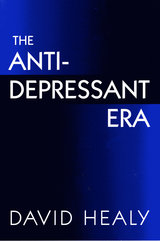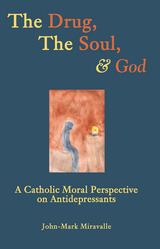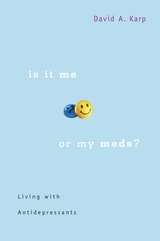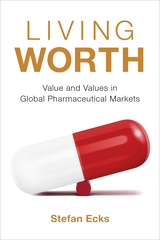
When we stop at the pharmacy to pick up our Prozac, are we simply buying a drug? Or are we buying into a disease as well? The first complete account of the phenomenon of antidepressants, this authoritative, highly readable book relates how depression, a disease only recently deemed too rare to merit study, has become one of the most common disorders of our day--and a booming business to boot.
The Antidepressant Era chronicles the history of psychopharmacology from its inception with the discovery of chlorpromazine in 1951 to current battles over whether these powerful chemical compounds should replace psychotherapy. An expert in both the history and the science of neurochemistry and psychopharmacology, David Healy offers a close-up perspective on early research and clinical trials, the stumbling and successes that have made Prozac and Zoloft household names. The complex story he tells, against a backdrop of changing ideas about medicine, details the origins of the pharmaceutical industry, the pressures for regulation of drug companies, and the emergence of the idea of a depressive disease. This historical and neurochemical analysis leads to a clear look at what antidepressants reveal about both the workings of the brain and the sociology of drug marketing.
Most arresting is Healy's insight into the marketing of antidepressants and the medicalization of the neuroses. Demonstrating that pharmaceutical companies are as much in the business of selling psychiatric diagnoses as of selling psychotropic drugs, he raises disturbing questions about how much of medical science is governed by financial interest.

With The Drug, the Soul, and God, John-Mark Miravelle examines the stance of the Catholic Church regarding the prescription and consumption of antidepressants. After a careful investigation of Catholic moral theology and philosophy, Miravelle argues that treating depression with medication alone fails to address the underlying causes of the depression and does not facilitate the cognitive, interpersonal, and environmental changes necessary for a patient’s long-term health. In addition, he suggests that such medication may deprive sufferers of providential opportunities for personal and communal conversion and sanctification. This controversial volume will engage theologians and medical professionals alike.

By the millennium Americans were spending more than 12 billion dollars yearly on antidepressant medications. Currently, millions of people in the U.S. routinely use these pills. Are these miracle drugs, quickly curing depression? Or is their popularity a sign that we now inappropriately redefine normal life problems as diseases? Are they prescribed too often or too seldom? How do they affect self-images?
David Karp approaches these questions from the inside, having suffered from clinical depression for most of his adult life. In this book he explores the relationship between pills and personhood by listening to a group of experts who rarely get the chance to speak on the matter--those who are taking the medications. Their voices, extracted from interviews Karp conducted, color the pages with their experiences and reactions--humor, gratitude, frustration, hope, and puzzlement. Here, the patients themselves articulate their impressions of what drugs do to them and for them. They reflect on difficult issues, such as the process of becoming committed to medication, quandaries about personal authenticity, and relations with family and friends.
The stories are honest and vivid, from a distraught teenager who shuns antidepressants while regularly using street drugs to a woman who still yearns for a spiritual solution to depression even after telling intimates "I'm on Prozac and it's saving me." The book provides unflinching portraits of people attempting to make sense of a process far more complex and mysterious than doctors or pharmaceutical companies generally admit.

READERS
Browse our collection.
PUBLISHERS
See BiblioVault's publisher services.
STUDENT SERVICES
Files for college accessibility offices.
UChicago Accessibility Resources
home | accessibility | search | about | contact us
BiblioVault ® 2001 - 2024
The University of Chicago Press









